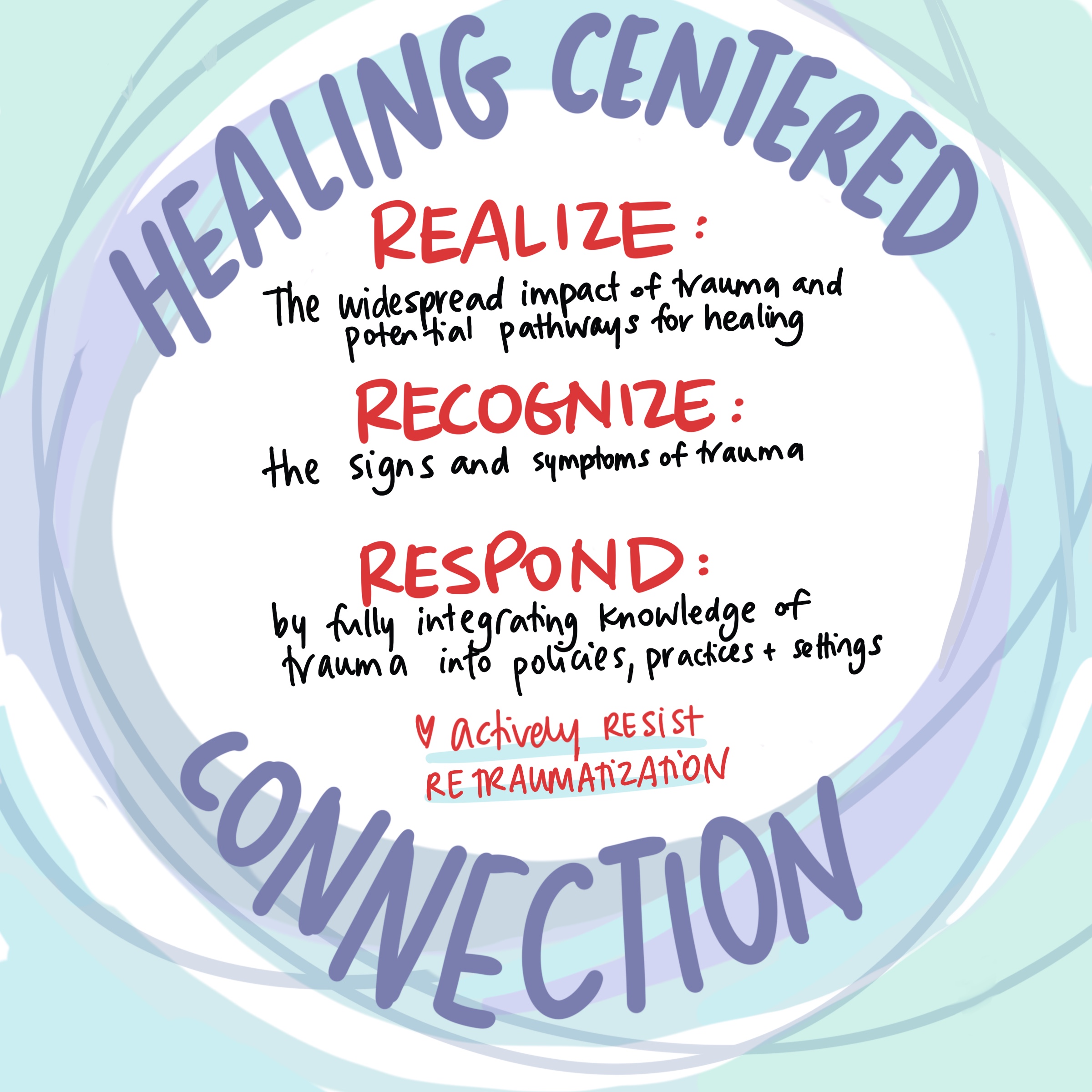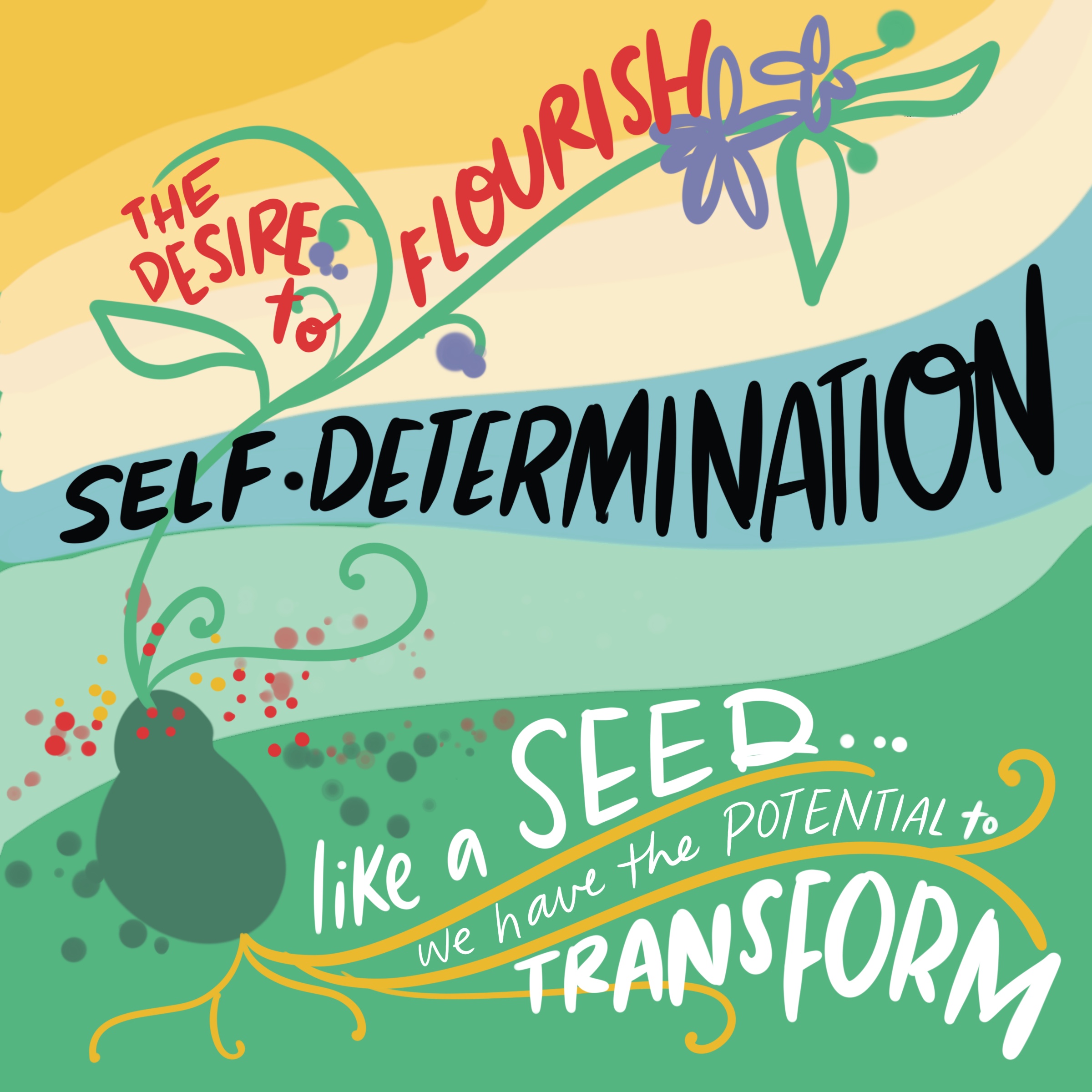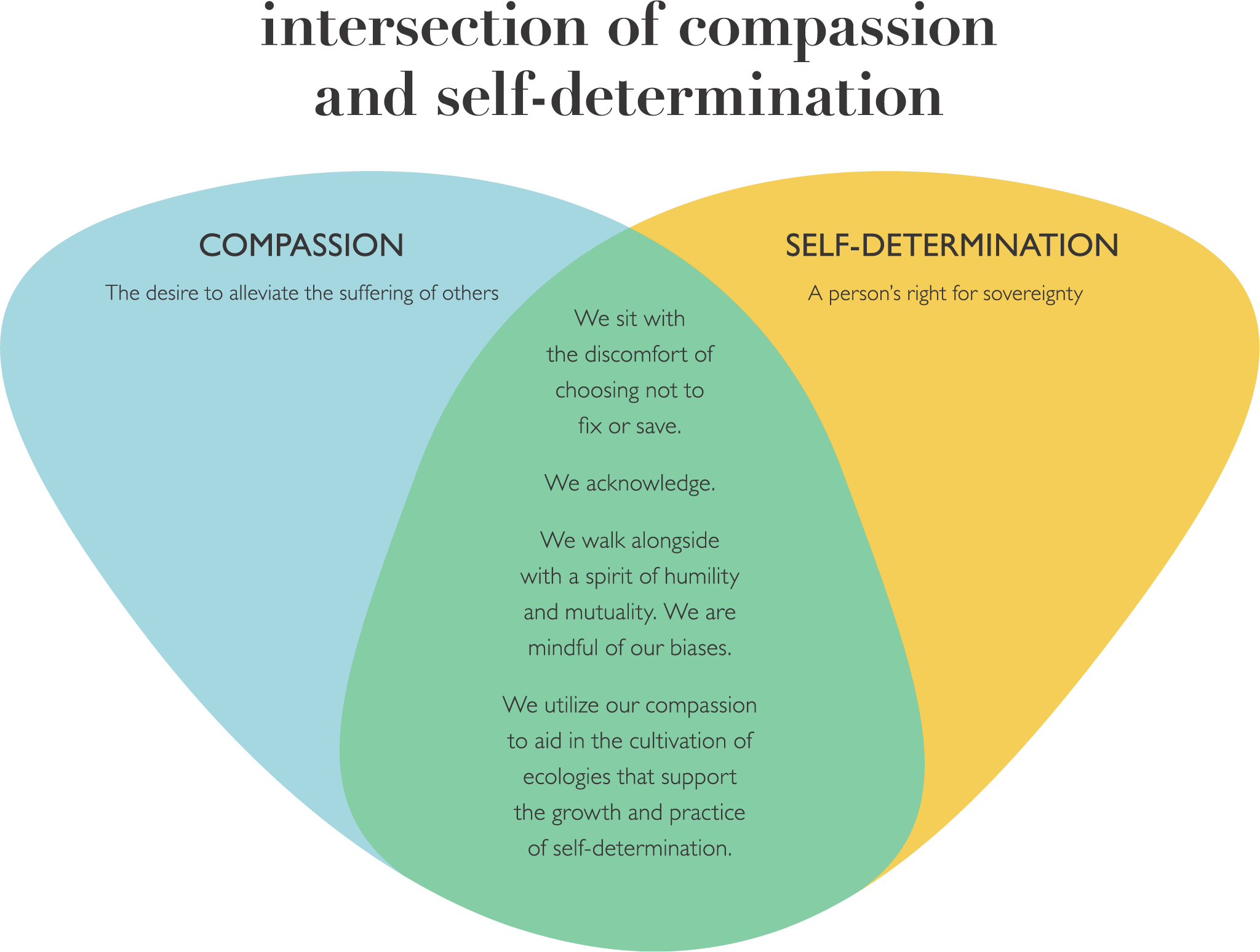Trauma-Informed Approach
All peer support services serve others with a trauma-informed approach. This means that we understand that trauma is pervasive, and we serve people with the intent of avoiding retraumatization.
It is very important that peer services are delivered in a way that supports safety, predictability, transparency, and choice at all times. Collaboration and mutuality are also important with a trauma-informed approach.
The standards of practice for peer support services included in this document, when applied and practiced, create a trauma-informed foundation.
Understanding Trauma
Often when we think of the word trauma, we think of it as a particular event. A stressful event causes trauma, but emotional and psychological trauma is actually the result of a stressful event. We define trauma as the emotional response following a stressful event.
Psychological and emotional trauma can leave someone feeling scared, unable to cope, helpless, overwhelmed, numb, and/or disconnected from self and others, and distrustful. Trauma can be caused by a threat to one’s physical safety or psychological safety. Sometimes simply witnessing someone else’s harm can also cause emotional and psychological trauma.
It is estimated that 76% of Canadians report having experienced a traumatic event during their lifetime.
SAMHSA’s Trauma-Informed Approach
 According to the U.S. Substance Abuse and Mental Health Services Administration (SAMHSA)’s Concept of Trauma and Guidance for a Trauma-Informed Approach (2014), an organization that takes a trauma-informed approach is expected to:
According to the U.S. Substance Abuse and Mental Health Services Administration (SAMHSA)’s Concept of Trauma and Guidance for a Trauma-Informed Approach (2014), an organization that takes a trauma-informed approach is expected to:
- REALIZE the widespread impact of trauma and understand potential paths for healing.
- RECOGNIZE the signs and symptoms of trauma in clients, staff, and others involved with the system.
- RESPOND by fully integrating knowledge about trauma into policies, procedures, practices, and settings.
- Actively RESIST RETRAUMATIZATION.
Six Key Principles of a Trauma-Informed Approach
The same SAMHSA document, Concept of Trauma and Guidance for a Trauma-Informed Approach (2014), lists the following six key principles of a trauma-informed approach:
- Safety
- Trustworthiness and Transparency
- Peer Support
- Collaboration and Mutuality
- Empowerment, Voice and Choice
- Cultural, Historical, and Gender Issues
We understand that all growth comes with discomfort. We recognize that this kind of discomfort doesn’t always feel good, but it can still be safe. Peer support services must be intentional at creating environments where people can feel safe enough to risk the discomfort of growth.
Mutuality and Peer Support
Clinical services such as psychiatric or professional counselling are by nature hierarchical. Clinical providers are in a position of power over the person they are serving, and there are some important ethical guidelines in place to protect those people receiving services. Most clinicians are trained not to share personal stories or anecdotes, whereas peer support workers are encouraged to share. In fact, peer support has a totally different grid than clinical services.
Embracing mutuality does not equate to friendship with people we support. Friendship grows organically over time with people who choose to contribute equally to a chosen relationship. When we use the word “mutuality” in peer support, we are speaking more about a balance of power. Both people must come from an equal place. Both come into the relationship not as experts, but as equals. There is an aspect of learning together that comes with peer-based roles; this means the peer support worker does not have to have it all together. It’s ok to say, “I don’t know” and to seek out the answer together. The peer support worker must not come from a place of “power over” someone, but rather they must intentionally walk alongside someone with a spirit of humility and reciprocity. Embracing the core value of mutuality is about our attitude towards another person. We are not there to fix, save, or direct someone else. Instead, we walk alongside, share our own stories when it is supportive, and we offer support and a listening ear.
Mutuality doesn’t negate the need for clear, and firm boundaries. Boundaries are necessary in this work. Please refer to the Boundaries module for further learning about this topic.
It’s also very important to have regular conversations with your supervisor and your team about what boundaries must look like in a post-secondary setting where there can be lots of overlap with relationships. Talking about these issues is very important to prevent messy, and awkward situations.
It is important to note that many peer support workers are paid, so there is still somewhat of a power differential there, and boundary work is important.
When we come to peer support with a more clinical worldview, the idea of mutuality can be hard to wrap our heads around.
What do we mean by mutuality in peer support?
- Mutuality is reciprocal. We are walking beside someone, rather than in front pulling or behind pushing them.
- Mutuality means that both people are learning. A peer support worker doesn’t need to have it all figured out. Setbacks are a part of life, and it’s ok not to have the answers. The role of a peer support worker is NOT to give advice. Rather, our role is to support our peer to find and trust their own knowing.
- Mutuality means that there is give and take in the relationship. Many of the people we support always find themselves on the receiving end of support. If we unpack that a little bit, constantly being on the receiving end could mean that there is an assumption of a problem. Such an assumption could be interpreted as “you are not in a position to give right now, because you are broken.” Healthy community relationships require both people to RECEIVE and to GIVE. The relationship can crumble if it becomes one-sided. Creating space for someone to give is an important part of peer support. All humans grow compassion, empathy, courage, and self-worth when we learn and have opportunities to give.
Self-Determination
Within each of us is an innate potential to flourish. Like all the potential held in a seed, we have a deep-rooted propensity towards growth. However, many things we face in life steal from the ecology that encourages that potential to grow. It’s also important to note that within mental health and substance use systems, there are many blockades inhibiting growth. We know that whether a seed grows depends on the conditions where that seed is planted; if the seed doesn’t get enough good soil, sun or water, it simply won’t grow.
Peer support is committed to creating ecologies where people can feel safe to tap into their inner wisdom and trust the process of taking agency of one’s life.
Self-determination is a person’s right to determine their own life and make their own choices about anything that affects their well-being.
Self-determination is about motivation. We know from Ryan and Deci’s self-determination theory, entitled Self-Determination Theory and the Facilitation of Intrinsic Motivation, Social Development, and Well-Being (2000), that motivation is fueled either.
- Extrinsically (by something outside ourselves–like a reward or punishment; it’s less about satisfaction or enjoyment and more about getting something in return)
- Intrinsically (fueled by purpose and meaning).
Lasting change comes through intrinsic motivation. However, we recognize creating ecologies that support intrinsic motivation are sadly uncommon.
Peer support workers can play a big role in facilitating ecologies where self-determination can flourish. Peer support is about relationship and connection; we do not fix, save, or rescue anyone. We do not give advice, because we can’t possibly know all the details of what someone is dealing with. We always have a limited perspective. Instead we support people to discover their inner teacher, so that they can make decisions for themselves.
When we choose to be attuned to the suffering of others, we can grow our compassion.
See the Venn diagram below. The diagram features Compassion (and the desire to alleviate suffering) on one side, and Self-Determination (a person’s right for sovereignty) on the other. In the role of peer support worker, it is essential that we balance the compassion we feel with supporting someone’s self-determination. This means choosing to be thoughtful and intentional about how we offer support. It is important to remember that each person is an expert on themselves even if they have lost their way and are not in touch with their inner wisdom. Creating the ecology of self-determination supports them on the journey to find and begin to trust their own inner wisdom.

In peer support work we intentionally choose to avoid trying to fix or save anyone. Instead, we walk alongside others with a spirit of humility, mutuality, and interconnection. We choose to contribute to the creation of an ecology in which people we support can find hope, unearth their strengths, learn to recognize their resiliency, and begin to trust their own inner wisdom. Like a seed, we have the potential to transform when the ecology supports self-determination and interconnection.
Worldview
(Including judgements, assumptions, and implicit biases)
“A worldview is a way of viewing or interpreting all of reality. It is an interpretive framework through which or by which one makes sense of the data of life and the world.”
~Norman Geisler and William Watkins
We acknowledge that everyone comes to the table with their own worldview based on their past experiences. In this work it is our goal to choose to see worldview as neutral and non-binary. It is simply a lens through which one sees the world.
In the work of peer support, we choose to avoid using the term “non-judgmental” because we recognize that judgements, assumptions and biases are part of the human experience.
In order to make sense of the immense stimulation that comes our way on any given day, our brains need to create containers or categories. If we didn’t do this, we would be overwhelmed by all the sensory data that comes at us all day long.
Our past experiences lay the groundwork for making meaning from the information that comes our way. It is impossible to remove our past experiences from the way we currently see the world. The meanings we create tend to be automatic reactions. Our brains fire with assumptions and judgements without us having to think consciously about the situation.
Neuroscientist Beau Lotto explores this topic of perception in his book Deviate: The Science of Seeing Differently (2017) where he writes that our brains aren’t wired to be objective. Instead, we are wired to create categories so we can make sense of the world, and therefore survive.
This wiring is key to our survival in the world. (Consider the quick thinking we need when we’re behind the steering wheel of a car. And thankfully we don’t have to relearn how to make coffee every day). However, though these categories we create can be essential for our survival, it is also important that we NOTICE when biases and assumptions come up – especially when they are directed at people or people groups. This noticing is the basis of mindful living.
Instead of creating a guideline of being non-judgmental, which is not attainable, this peer support training curriculum guides peer support workers to become more aware of the judgements, biases and assumptions we all have. It is essential when doing this work that we recognize when they surface with the people we support, that we learn how to question our biases and assumptions, and consciously do the work to challenge and change them.
This is how we begin to recognize our implicit biases and then move into deconstructing them. The only way we can begin to work with our implicit biases is to bring them out into the open.
Choosing to face our judgements, assumptions and biases, and challenging them are huge steps in creating a safe environment where deep connection can occur. When we deeply understand that all human beings judge, we can mindfully choose to challenge our assumptions because we no longer feel the need to take a defensive stance. With this approach we are seeking to understand another person, rather than seeking to be right. This humility creates greater connection and is a salve within all types of conflict.
Remember – Peer Support Is Not Clinical
While we’ve mentioned this above, it’s worth repeating that peer support in post-secondary campuses should never be clinical. Since a clinical, hierarchical approach is so prevalent in our broader society and culture, it will take time, intention and work to notice when we’re acting or reacting with a clinical lens and shift back toward a peer support lens.
Media Attributions
- Healing-centered connection by Drawing Change is licensed under a CC BY 4.0 licence.
- Self-determination by Drawing Change is licensed under a CC BY 4.0 licence.
- Intersection of compassion and self-determination by Jeseye Tanner is licensed under a CC BY 4.0 licence.

